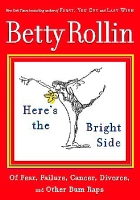Results have just come in from the pathologist for my third biopsy.
Cyst status: BENIGN

random thoughts through life, learning and breast cancer

 Can getting cancer make you happy? For Betty Rollin, survivor of two breast cancers, there’s no question about it. In her newest book, “Here’s the Bright Side,” Ms. Rollin recounts:
Can getting cancer make you happy? For Betty Rollin, survivor of two breast cancers, there’s no question about it. In her newest book, “Here’s the Bright Side,” Ms. Rollin recounts: “There are two Lance Armstrongs, precancer and post,” he recounted in his 2001 memoir, “It’s Not About the Bike: My Journey Back To Life.” “In a way, the old me did die, and I was given a second life.” He created a foundation to inspire and empower people affected by cancer, helping them live life on their own terms.
“There are two Lance Armstrongs, precancer and post,” he recounted in his 2001 memoir, “It’s Not About the Bike: My Journey Back To Life.” “In a way, the old me did die, and I was given a second life.” He created a foundation to inspire and empower people affected by cancer, helping them live life on their own terms. She suggests creating a “personal happiness list” to help you remember favorite pastimes and reintroduce former delights into your life. Or perhaps you might want to explore activities that in your precancer life, you thought you had no time for, like studying a foreign language, traveling for pleasure or spending more time with friends.
She suggests creating a “personal happiness list” to help you remember favorite pastimes and reintroduce former delights into your life. Or perhaps you might want to explore activities that in your precancer life, you thought you had no time for, like studying a foreign language, traveling for pleasure or spending more time with friends. Amidst the constant rains and flooding in our city, I had my minor surgery on Wednesday, to remove the new lump that I just discovered on my remaining breast just this last Monday. The whole procedure took about two hours. I just had it done in my doctor's clinic, with local anesthesia. This was a personal request from me as I have grown quite tired of the usual hospital protocol of having to go through the Emergency Room and about a dozen inquiring residents who all have the same set of questions to ask.
Amidst the constant rains and flooding in our city, I had my minor surgery on Wednesday, to remove the new lump that I just discovered on my remaining breast just this last Monday. The whole procedure took about two hours. I just had it done in my doctor's clinic, with local anesthesia. This was a personal request from me as I have grown quite tired of the usual hospital protocol of having to go through the Emergency Room and about a dozen inquiring residents who all have the same set of questions to ask. My surgeon, Dr. Emil Salcedo just talked me through the operation, with a myriad of topics from mountain bikes, to siopao, to church politics. I was trying not to laugh too hard at his usual and somewhat satirical take on such things. I tried my best not to look at the incision he was working on, just a few inches below my chin, but the lure of the grotesque was just too much. I would sneak a look once in a while, but not too long as I always turn queasy at the sight of blood.
My surgeon, Dr. Emil Salcedo just talked me through the operation, with a myriad of topics from mountain bikes, to siopao, to church politics. I was trying not to laugh too hard at his usual and somewhat satirical take on such things. I tried my best not to look at the incision he was working on, just a few inches below my chin, but the lure of the grotesque was just too much. I would sneak a look once in a while, but not too long as I always turn queasy at the sight of blood. Once there was a man who would go to the ocean to do his writing. He had a habit of walking on the beach before he began his work.
Once there was a man who would go to the ocean to do his writing. He had a habit of walking on the beach before he began his work. think happiness is like that.
think happiness is like that.Below is an article that I found on emotional wellness and cancer. It has offered me empowerment as I proceed with my journey.
MedWire News: Breast cancer patients with low levels of distress survive longer and have lower levels of disease recurrence than those with high levels of distress, study findings show.
 In the meantime, I just came across an article about resilience. It defines people with resilience as those who harness inner strengths and rebound more quickly from a setback or challenge. These are the people who have the ability to say to themselves, "OK, this bad thing happened, and I can either dwell on it or I can learn from it."
In the meantime, I just came across an article about resilience. It defines people with resilience as those who harness inner strengths and rebound more quickly from a setback or challenge. These are the people who have the ability to say to themselves, "OK, this bad thing happened, and I can either dwell on it or I can learn from it."